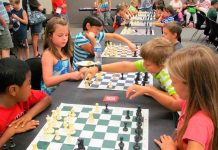Конспект урока по английскому языку в 6-м классе
по теме Pastimes
МБОУ СОШ № 17 г.Архангельска
Учитель английского языка Смирнова Людмила Григорьевна
Цели урока:
1) практическая – формирование лексических и грамматических навыков чтения и говорения в рамках изучаемой темы;
2) воспитательная – развивать умение слушать других, высказывать свое мнение;
3) развивающая – развивать умение переноса усвоенного материала в новую ситуацию;
4) образовательная – расширение кругозора учащихся.
Оснащение: Картинки для монологической речи, магнитофон, тексты по теме, проектор, экран, учебник «Happy English.ru» (авторы М.Ю.Кауфман, К.И.Кауфман).
Ход урока:
1. Организационный момент. Введение в тему урока.
Good afternoon, my friends. I’m glad to see you. It’s time to start our lesson, isn’t it?
(Учащиеся приветствуют учителя и отвечают на вопрос).
So, let’s start. Today we are going to read and speak about nice things. Any ideas about them?
If there are no, look at the blackboard and guess the word.
(Цифры написаны на доске).
16, 1, 19, 20, 9, 13, 5, 19.
You know how to do it, don’t you? 1–A, 2–B, 3–C, etc.
Write in capital letters, please. (Ученики по очереди пишут под цифрами буквы).
Read the word.
PASTIMES
It is our topic today. Do you know what a pastime is?
It is something that you enjoy doing in your free time.
Are pastimes important for you? Why?
(В зависимости от ответов учащихся). I (don’t) agree with you. Pastimes make our life interesting, because All work and no play makes Jack a dull boy.
It is a proverb. Can you translate it? (Ответ учащихся).
The English say, «Только работа и никакой игры делают Джека скучным малым».
In Russia we say, «Мешай дело с бездельем – проживешь век с весельем».
Can you explain the proverb? (Ответ учащихся).
I agree with you. You must have some time for rest, games and hobbies after work.
It is good for your health and mind.
By the way, can you give a synonym to the word pastime?
2. Фонетическая зарядка.
a) You know a lot of different pastimes, don’t you? Let’s remember them. Look and read.
(На экране проектируются слова прошлого урока: упр. 4 стр.140).
| playing games | fishing | |
| doing sports | cooking | going out |
| watching TV | shopping | jogging |
| sleeping | hiking | sewing |
| reading | eating | acting in plays |
| collecting things | knitting | hunting |
| gardening | playing musical instruments | drawing |
| travelling |
|
|
Do you know any other pastimes?
(Можно ввести дополнительно интересующие ребят занятия: diving, rafting, playing yo-yo, Rubik’s cube, etc.).
b) Look at the pictures and name the pastimes. (На экране демонстрируются картинки упр. 4 стр.140).
c) Let’s play. I’ll think of a pastime. Guess it. (Угадавший загадывает свое слово).
(Можно усложнить задание, описывая занятие).
3. Активизация лексических единиц.
а) You know the words well. Now listen to my statements and react.
Model: Travelling is interesting and useful – I agree with you. We can see different places, meet new people and learn a lot of interesting things.
These expressions can help you
| It’s great (expensive, useful, interesting) | |
| Watching TV is boring | I agree with you / I don’t agree with you |
| Reading is useful | I like / I don’t like |
| Collecting things is interesting | I am (not) interested in… |
| Hunting is dangerous | It’s my favourite pastime |
| Playing games is good for children | (На экране) |
| Shopping is awful |
|
| Hiking is boring |
|
| Playing musical instruments is beautiful |
|
| Fishing in rainy weather is awful |
|
| Jogging is dangerous |
|
| Acting in plays is great |
|
b) Work in pairs. Tell each other about your hobbies and pastimes. Use Me too, I don’t, too, either.
(По упр.6(а) стр.141).
Model: I like jogging – Me too / Do you? I don’t / I like jogging too.
I am (not) interested in…
I am (not) good at…
I enjoy…
Cooking is (not) my hobby.
4. Монологическая речь. (Проверка домашнего задания).
Now we are going to read and speak about other people’s pastimes. Let’s start with these ones. Look at the pictures. (На экране рисунки детей: James, Rosy, Mark). Who are these persons? You know the information because it is your home task. Tell about them and their pastimes. Let’s start with James.
Who would like to tell about Rosy and her pastimes?
Mark is an interesting person, isn’t he? What about him and his pastimes?
(Учитель комментирует ответы учащихся).
5. Аудирование.
James, Rosy and Mark like different pastimes. What about their friends Misha and Alice? Listen to the information and tell about their pastimes. (Слушают текст, упр.7 стр.141).
Say what Misha and Alice like doing and what they don’t like doing. Use too, either.
6. Физкультпауза.
Are you tired? Let’s relax. These pastimes can help you.
Sleeping Knitting
Sewing Reading
Playing the guitar Fishing
Swimming Drawing
Jogging Flying, etc.
(Учащиеся выполняют действия).
Are you tired now? Let’s go on.
7. Чтение текстов.
English children have different hobbies and pastimes. Let’s read about one of them.
BEN’S HOBBY
Ben’s hobby is playing chess. He is learning to play the game and usually plays with his father. It is difficult to play chess. Ben must know what his father is going to do. When Ben plays chess, he is learning to think.
Sometimes Ben plays with his friend John. They play chess in the garden or in John’s house. John plays chess very well and he says it helps him to play football. He sees the playground as he sees the chess board.
Answer the questions:
Is Ben’s hobby interesting?
Is it difficult to play chess?
Does Ben play chess only with his father?
Who plays better – Ben or his friend?
Now tell about Ben’s hobby.
(При затруднении можно дать опорные фразы🙂 playing chess
usually plays
sometimes
plays very well
it helps
Let’s get some more information about English people’s pastimes.
GARDENING
English people like gardening. They talk about it in their offices, factories and at home. In the evening they work in their gardens, large and small, and they do it in any weather. They grow flowers, vegetables and fruit there.
If an Englishman has no garden he grows something in a window box outside his kitchen.
If you want to please an Englishman, be very polite about his garden. Perhaps, he will show you his garden and tell you about it. So you will listen to it and say, «How nice!» or «How interesting!».
Repeat and complete the sentences:
1) English people like…
2) They talk about it…
3) They work in their gardens…
4) They grow…
5) An Englishman can show you…
6) You can say…
8. Заключительный момент.
So you see, different people like different pastimes and hobbies. They help us to learn many interesting things, find new friends or just relax. I hope you can tell a lot about your hobbies and pastimes and your home task is to write about them. You can draw pictures or use photographs. The best variant is your computer presentation.
I like your work today. Thank you for the lesson. The lesson is over. Good bye!
Использованные источники:
1. Reading for pleasure. Книга для чтения на английском языке в 8-м классе средней школы. Составитель Е.К.Поздеева. Москва, Просвещение, 1990 г., стр.50.
2. English Reader. Книга для чтения к учебнику 5-го класса. Составители Е.Г.Копыл, М.А.Боровик. Москва, Просвещение, 1982 г., стр.64-65.





